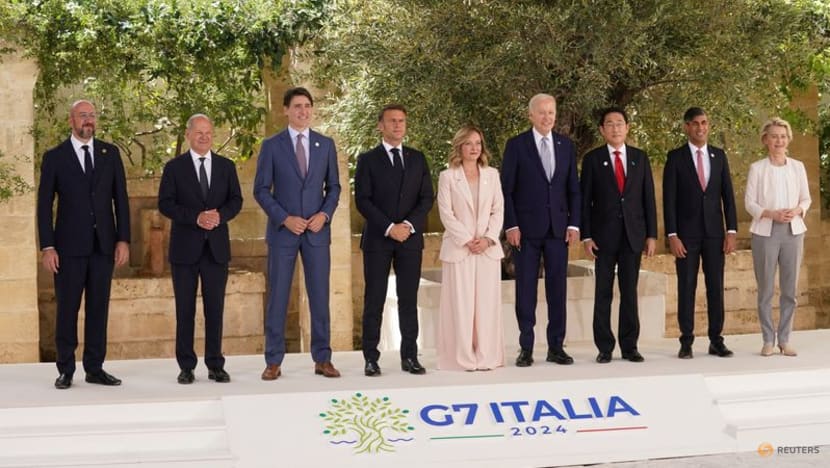
G7 leaders turn their attention to China on Friday (Jun 14) on the second day of an Italy summit, with a focus on how to protect their industries while avoiding an outright trade war with Beijing.
Fair trade with the world’s second-largest economy, notably on green technology, will be discussed by US President Joe Biden and the leaders of Japan, France, Germany, Italy, Canada and Britain in Puglia.
The Group of Seven rich democracies will also be seeking a common response to China’s alleged support of Russia’s military expansion, which Washington says is fuelling the war in Ukraine.
“G7 countries are on the same page vis-a-vis China,” a Japanese government source told AFP.
The meeting comes amid souring trade relations between China and the West, exemplified by the European Union’s announcement this week of plans to impose new tariffs on Chinese electric vehicles.
The US, Japan and the European Union – which attends G7 summits as an unofficial eighth partner – have all voiced concern over China’s so-called “industrial overcapacity“.
They say generous subsidies by Beijing, particularly in green energy and technology sectors such as solar panels and electric vehicles, result in unfairly cheap goods flooding the global market.
That excess capacity threatens Western companies struggling to compete, particularly in the growing green tech sector.
“We will confront China’s non-market policies that are leading to harmful global spillovers,” John Kirby, the US National Security Council spokesman, told journalists ahead of the summit.
China has dismissed the concerns, but Washington is pressing for a united G7 front.
The group’s finance ministers warned last month that they would weigh steps to “ensure a level playing field” for all countries.
EXPORT CURBS
On the eve of the summit at the luxury Borgo Egnazia resort, the EU threatened to hit imports of Chinese electric vehicles with tariffs of up to 38 per cent beginning next month.
Beijing denounced what it called “naked protectionist behaviour” and said it reserved the right to file a suit with the World Trade Organization (WTO).
The United States hiked tariffs last month on Chinese green tech imports, including a 100 per cent tariff on electric vehicles, with Biden blasting “cheating” on Beijing’s part.
Another focus on Friday is China’s recent restrictions on exports of minerals such as gallium, germanium and graphite, which are critical in industries such as telecommunications and electric vehicles.
The curbs threaten international supply chains, and there are fears they could be followed by restrictions on other materials such as rare earth elements needed in electronics.
Analysts warn of near-term supply shortages and higher prices if China were to further restrict exports, even as the United States and other countries seek to diversify their supplies, including by boosting domestic production.
“RUSSIA’S WAR MACHINE”
Security and defence concerns are also being addressed at the summit, including accusations Beijing has helped expand Russia’s armed forces.
During a press conference with Ukraine’s President Volodymyr Zelenskyy on Thursday, Biden said the G7 had “agreed to taking collective action” against China’s role in supplying Russia with “materials they need for their war machine“.
Washington has accused Beijing of helping Russia’s defence industry – and therefore its invasion of Ukraine – through joint production of drones and exports of machine tools needed for ballistic missiles.
Zelenskyy said he had spoken by phone with Chinese President Xi Jinping, who “gave me his word” that he would not sell weapons to Russia.
“We will see,” Zelenskyy added.
G7 leaders will also address security in the Asia-Pacific, where China’s confrontational tactics and militarisation of islands in the South China Sea – as well as its recent war games around self-ruled Taiwan – have increased fears of a potential conflict.
At the last G7 summit, in Japan, the leaders said in their final statement that they “oppose China’s militarisation activities in the region“.
The Japanese government source said it was crucial for the leaders meeting in Puglia to send a clear message to Xi that the issue was not merely regional, but of concern to all the G7 nations.
“All the (G7) countries are aware that we need to convey the message very candidly to the Chinese at the very top level,” the source said.
AFP/CNA

